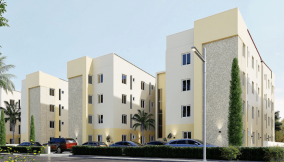Investors say property registration in Lagos is becoming tedious as it requires 17 different steps that are stifling the ease of doing business in Nigeria’s economic capital.
According to investors, the 17 different steps contrast with what obtains in mature property markets like London where a developer has only nine steps to go through and does so from the comfort of his office or home. This ensures minimal or no interface with state officials.
In Lagos, there are several agencies that a developer has to see for approvals before registering a property. They include: the Lagos State Physical Planning Permit Authority otherwise known as Planning Permit Authority (LASPPPA); Lagos State Safety Commission (LSSC); Ministry of Physical Planning and Urban Development (MPPUD); Lagos State Materials Testing Laboratory (LSMTL), and Lagos State Environmental Protection Agency (LASEPA).
There are also other agencies in the saddle such as Lagos State Fire Service (LSFS) (for a building that is just being constructed); Standards Organisation of Nigeria (SON); Lagos Waste Management Authority (LAWMA); Lagos State Water Regulatory Commission (LSWRC); and Lagos State Internal Revenue Service (LIRS), among others.
“Nigeria needs to cut down on the bottlenecks in giving approvals to developers, especially as it concerns the requirements to meet for planning, thereby fostering diaspora investment,” Gbenga Olaniyan, chairman of Estate Links, said in Lagos recently.
Read also: Lagos leads: 5 African cities with the least affordable real estate in 2024
The World Bank Ease of Doing Business used property registration as a key metric for assessing business environment. It ranked Lagos, Ogun and Rivers low in 2021.
However, the global lender halted it in September 2021 in order to improve upon the metrics.
Using London as a case study, Gboyega Familehin, founding partner of Diya, Fatimilehin & Co, Olaniyan, said the 17 different steps required by Lagos is doing more harm to the state’s investment climate than good.
“You have nine different requirements. So, you conceptualise your drawings, pay a fee online, the local authorities will acknowledge, register and it goes all the way to discharging conditions. But in Lagos, we have 17 different steps, which is almost double those of London.”
“Very recently, another law came up that even for the signage in front of your property, showing who all the consultants are, you have to go to Lagos State Signage and Advertisement Agency (LASAA), pay some money and get your permit to put up the signage,” Olaniyan noted.
He cited what happens in London where developers put together all their documents, submit them online, and pay online. The authorities will go through their paperwork, and if everything is in order, send emails giving approval for construction.
“However, if you’ve got problems, they come back to you, and inform you of the changes that you need to make, and then you send a mail back to them when you’re ready, and they come for inspection,” he said.
The 2023 Nigeria Subnational Ease of Doing Business (EoDB) Report has shed light on the varying degrees of business-friendliness across different states in the country. The report’s indicators and data collection methods and metrics were clearly defined within six indicators, including infrastructure, transparency and accessibility of information, skills and labour, secure and stable environment, regulatory environment, and economic opportunity.
Read also: Luxury real estate welcomes new trend with strong appeal to diaspora investors
According to the report compiled by the Presidential Enabling Business Environment Council (PEBEC), “overall EoDB satisfaction in Nigeria has seen marginal improvement, but dissatisfaction remains.”
Experts are of the view that the cumbersome processes that define property registration in many states of Nigeria affect not only the economy of the respective states but also that the country as a whole. This belies all the claims by politicians across the country on the provision of the ease of doing business.
In January 2024, Lagos State launched a land administration portal to improve ease of doing business, fast-track property registering process, reduce corruption in the process and ensure security of titles and operations.
However, investors are worried by the long, tedious 17 steps for registering property which involves multiple agencies of government, some of which are new additions.
“Our economic trajectory has been disturbing. As at 1962, our GDP was $4.91 billion which was more than the GDP of South Korea, which stood at $2.24 billion at that time.
“While we are still hovering around $400 billion, South Korea is now around $1.7 trillion with a per capita income of $33,170 compared with our own $1,700,” Olusegun Mimiko, former governor of Ondo State, said recently.
Mimiko, who was once a minister of Housing and Urban Development, said Nigeria is plagued with capacity and financial deficits hindering its development as a nation, noting that economic development can only be possible when there is security of lives and property, attributing the low investment in the country to rising insecurity, among other things.
Join BusinessDay whatsapp Channel, to stay up to date
Open In Whatsapp





